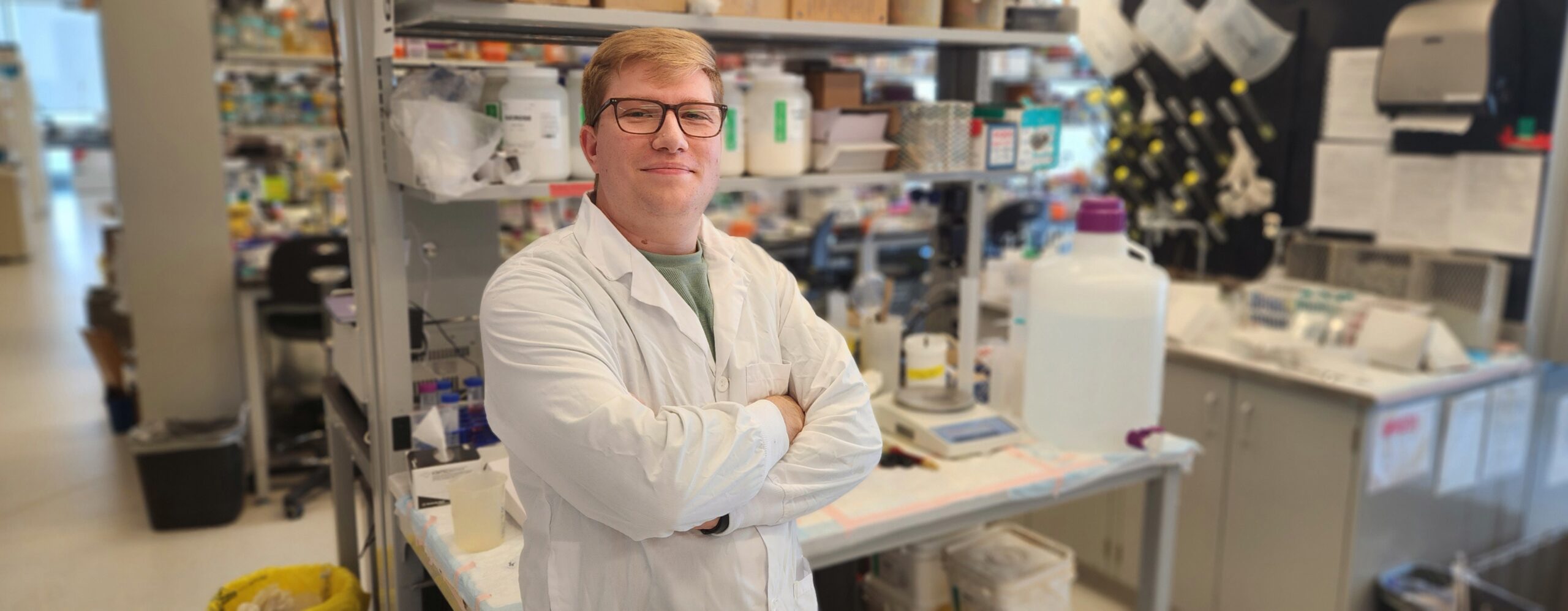June 15, 2023
By Betty Zou
The Emerging and Pandemic Infections Consortium is pleased to announce Landon J. Getz as the recipient of the inaugural GSK EPIC Convergence Postdoctoral Fellowship in Antimicrobial Resistance (AMR).
Established through a generous gift from GlaxoSmithKline (GSK), the fellowship will support Getz’s innovative and cross-disciplinary research that aims to address the growing threat of AMR through the development of phage therapy.
Bacteriophages, or phages for short, are viruses that can infect and kill bacteria. As conventional antibiotics lose their effectiveness, many are turning to phages as a last resort therapy to treat drug-resistant infections.
“We know that bacteria can rapidly become resistant to antibiotics, and if we plan to use phages as therapeutics, we need to know how bacteria will respond to them,” says Getz, a postdoctoral fellow jointly supervised by Karen Maxwell and Mikko Taipale, associate professors in the departments of biochemistry and molecular genetics, respectively, at the University of Toronto’s Temerty Faculty of Medicine.
His project aims to identify new phages that can target the bacteria Vibrio parahaemolyticus, the leading cause of food poisoning caused by consumption of contaminated seafood. More worryingly, infections caused by the bacteria are increasing each year and becoming more difficult to treat with antibiotics, highlighting the need for alternative therapeutic approaches.
In addition to creating a diverse library of phages against V. parahaemolyticus, Getz is also working to understand how the bacteria defend themselves against phages. This knowledge will help researchers better predict how a phage or mixture of phages will behave clinically and increase the chances that a phage therapy will work. His research combines the traditional biochemical and genetic approaches used to study bacteria-phage interactions with advanced robotics and high-throughput technologies that will enable him to conduct his studies at a large scale.
“The GSK EPIC Convergence Postdoctoral Fellowship in AMR provides me the confidence, freedom, and multidisciplinary support to explore phage-bacteria interactions broadly in important human pathogens,” says Getz, who is also the co-founder of Pride in Microbiology and a past member of the Youth Council of the Chief Science Advisor of Canada.
“This exploration is the beginning of a research program that will illuminate how bacteria respond and resist phage infection — and how we might prevent this in the future — to ensure the success of future phage therapies.”
“We are excited to partner with GSK to support leading-edge research on AMR. Landon’s work embodies the collaborative, cross-disciplinary approaches that are needed to drive progress in this field and advance solutions to tackle the urgent threat posed by drug-resistant bacteria,” says Scott Gray-Owen, EPIC’s academic director and professor of molecular genetics at U of T.
“Congratulations to Landon Getz on his research proposal selected by the Emerging and Pandemic Infections Consortium for the GSK EPIC Convergence Postdoctoral Fellowship in AMR. Antimicrobial resistance threatens the sustainability of health care systems, food supply, and the economy. GSK is proud to support research and talent to get ahead of this urgent and critical subject for Canada and the world,” says Ranya El-Masri, Vice President of Government Affairs and Market Access for GSK Canada.
The GSK EPIC Convergence Postdoctoral Fellowship in AMR provides $120,000 in funding support over two years to a postdoctoral fellow who is driving an AMR-focused project that bridges two research disciplines.


